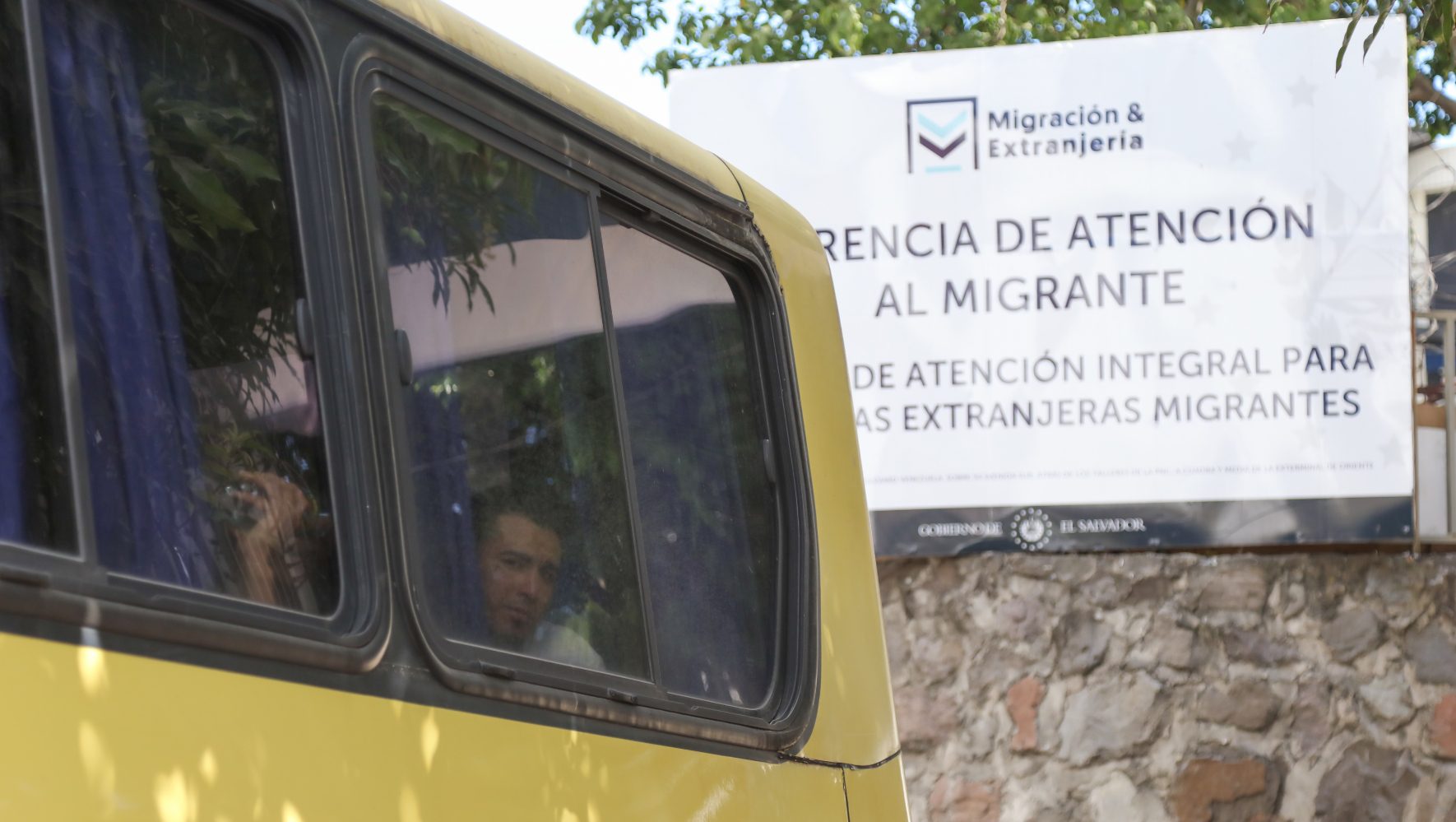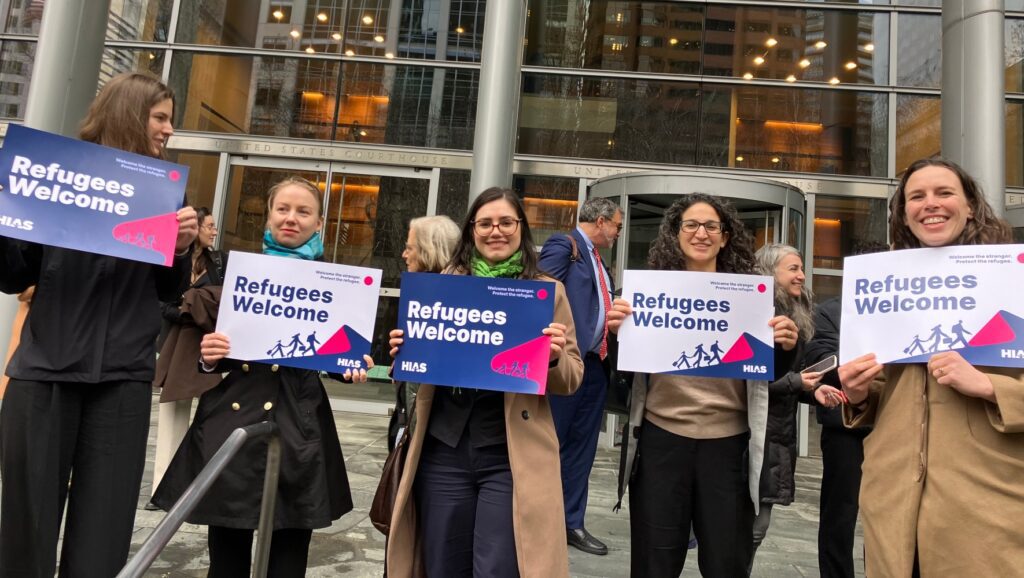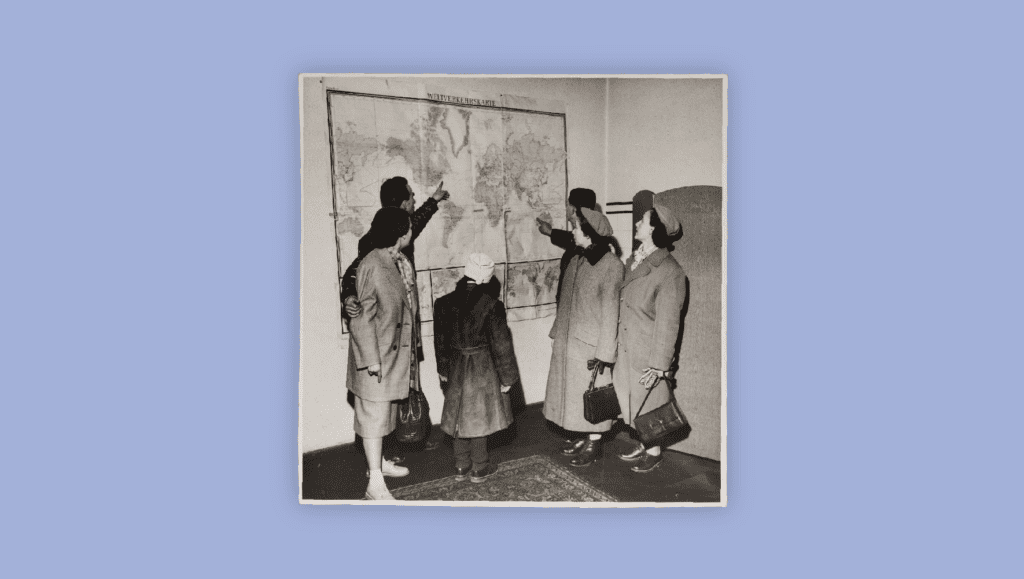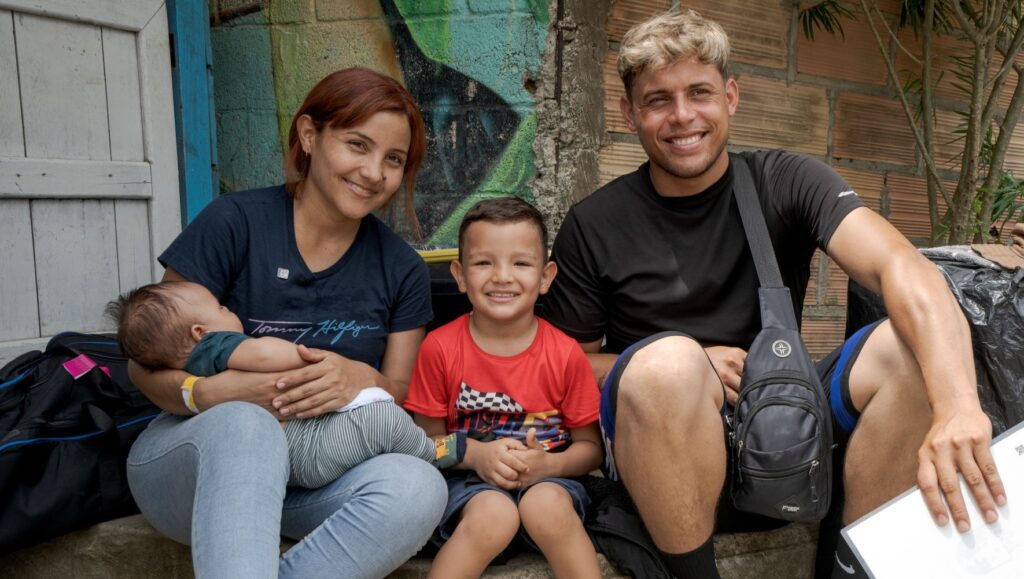
Since President Trump was inaugurated on January 20, his administration has initiated a drastic overhaul of U.S. immigration, asylum and refugee policy, making many of the most vulnerable people in our society profoundly less welcome and safe. This transformation goes far beyond the usual adjustments undertaken following a political change in Washington: They represent an attempt to undermine decades, if not centuries, of American law. A flurry of lawsuits, including two joined by HIAS, have contested some of these measures, but over the course of the first 100 days, the landscape has only gotten more dire for refugees and immigrants.
HIAS has documented the executive actions, memoranda, and legislation of his administration in a series of weekly articles, summarizing key details about the news as well as distilling their meaning. As this administration marks 100 days in office, it is time to take stock of these changes — and the devastating effects they have had on people both in the United States and around the world.
Suspension and Termination of Refugee Resettlement
On his first day in office, President Trump signed an executive order to halt the admissions of refugees fleeing violence and persecution. One hundred days later, the U.S. Refugee Admissions Program (USRAP), a program with a decades-long legacy of bipartisan support, remains shuttered, and tens of thousands of people have been left stranded abroad, many already approved to travel to the United States. The government took additional steps to dismantle the refugee program infrastructure and issued suspension and termination notices to refugee agencies. HIAS and our partners have fought these decisions in court, but the Trump administration has not complied with court orders to resume refugee resettlement.
The changes have also made many of the most vulnerable people in our society profoundly less welcome and less safe.
Removal of Legal Protections for Vulnerable Populations
- The Trump administration terminated humanitarian parole programs for Afghanistan, Ukraine, Cuba, Haiti, Nicaragua and Venezuela, which were created by the Biden administration to provide a carefully controlled legal pathway for people fleeing countries facing economic and humanitarian crisis, also reducing incentives for citizens of those countries to cross into the United States at the U.S.-Mexico border. In addition to closing these pathways to new registrants, he also announced plans to strip humanitarian parole from people who were already welcomed through these programs. These moves dovetail with the administration’s curtailment of Temporary Protected Status (TPS) for Venezuelans, Afghans, and Haitians. For hundreds of thousands of people, this termination not only threatens their ability to remain in the United States and be authorized to work — it also leaves them open to being sent back to danger in their home countries.
- Since taking office, President Trump has made it virtually impossible for asylum seekers presenting at U.S. land borders to enter the country. He has taken significant steps to erode the human right to seek asylum, including by directing immigration judges to issue denials without a hearing, which will almost certainly lead to rapid deportations of individuals to countries that they fled. Seeking asylum is a legal pathway, and attacks on it are a significant abrogation of human rights and a contravention of long-held American values.
- President Trump took many early steps to militarize the border and crack down on border crossings, even of vulnerable asylum seekers. He declared a national emergency at the border on Inauguration Day, allowing him to deploy armed forces to defend against a nonexistent “invasion.” He formally reinstated Migrant Protection Protocols (MPP), commonly known as “Remain in Mexico,” which requires non-Mexican asylum seekers to remain on the Mexican side of the border while waiting for their asylum claims to be decided. This leaves them at risk of kidnapping, rape, extortion, and other forms of violence. He also changed the CBP One app, which the Biden administration had created to allow asylum seekers to schedule appointments with U.S. immigration officials, into a tool for people to “self-deport.”
- The Trump administration has also attacked individuals and organizations within the United States who help asylum seekers. In March, President Trump issued an executive order disparaging attorneys who practice immigration law, alleging them and their law firms of “unscrupulous behavior.” A separate executive order would make individuals who work for companies that aid displaced people ineligible for forms of student loan forgiveness. The combined impact of these orders will induce a chilling effect that will have its most severe repercussions on immigrants, asylum seekers, and refugees themselves.
- The Trump administration issued an executive order to terminate birthright citizenship, a pillar of U.S. law for well over a century and a right enshrined by the 14th amendment to the Constitution. The Supreme Court will consider this case in the weeks to come, but the brazenness of this action underscores how radically the Trump administration is attempting to alter a longstanding consensus of immigration.
Give today
Teardown of Global Humanitarian Assistance
On January 20, the Trump administration announced a 90-day pause on all foreign aid spending. In the following weeks and months, organizations that provide everything from hygiene products to medical assistance to vaccines to education were issued suspension and termination notices, and had their funding stripped away. That, combined with the dismantling of U.S.A.I.D., has had a cataclysmic humanitarian effect worldwide. Millions of people all across the world who are affected by crisis, conflict, and poverty, have lost access to support for their basic needs. Many organizations, like HIAS, have had to curtail essential services to displaced people including Sudanese refugees fleeing civil war and Ukrainians seeking to re-establish their lives following war in their country. The impacts of these cuts are only beginning to unfold, but will be widespread.
Mass Deportations
- The Trump administration has placed mass deportations at the centerpiece of its immigration policy, vastly expanding the federal government’s capacity to apprehend, detain, and deport people. The president has referred to undocumented immigrants as “invaders” and characterized their presence in the United States as a national emergency to justify extreme actions. In its first 100 days, the Trump administration claims it has deported around 140,000 people — a figure that some independent analysts dispute. Nevertheless, the pace of deportations thus far exceeds that of the first 100 days of Trump’s first term in 2017.
- President Trump has conducted deportations with a conscious disregard for due process — a position he has explicitly endorsed. This violates a core constitutional principle and has led to a myriad of shocking mistakes. The case of Kilmar Abrego Garcia, a legal Maryland resident deported to El Salvador in an “administrative error,” only for the administration to refuse to facilitate his return, is only the most high-profile example.
- President Trump has expanded expedited removal, a process that allows people to be deported without a full hearing before an immigration judge, using it as a tool to quickly execute mass deportations.
- The Trump administration has invoked the Alien Enemies Act (AEA) of 1798 to justify rounding up and shipping alleged members of Tren de Aragua, a Venezuelan gang, to a maximum-security prison in El Salvador — even though the AEA only applies to sovereign states with whom the United States is at war. There is little evidence to suggest that all, or even most, of those deported were actually members of Tren de Aragua.
- The administration has targeted non-citizen students at universities across the United States for protected political speech, disingenuously using antisemitism as justification for its actions.
- On January 29, President Trump signed the Laken Riley Act, which enables the Department of Homeland Security to detain undocumented immigrants charged with or accused of a crime — even if they have not been convicted.
- The administration issued an executive order authorizing Immigration and Customs Enforcement (ICE) to enter previously shielded places like schools, hospitals, and churches to detain undocumented immigrants.
- They have also threatened and targeted so-called “sanctuary cities,” jurisdictions which lawfully protect public safety by limiting ICE’s ability to detain undocumented immigrants.

Jewish Clergy Speak Out on the Immoral Use of the Law
Read MoreWhat It Means — and How We Are Responding
The Trump administration’s actions over the last 100 days constitute an extraordinary attack on immigrants, asylum seekers, and refugees to the United States — and the individuals and organizations who serve them. As the world’s oldest refugee agency, HIAS has quickly regrouped to meet the moment.
Soon after the inauguration, HIAS joined two lawsuits to fight back against the administration’s unlawful policies. On February 10, HIAS joined Pacito v. Trump, a lawsuit challenging the Trump administration’s suspension of the U.S. Refugee Assistance Program. The next day, HIAS joined Global Health Council vs. Trump, which sought to block the administration’s halt of foreign aid funding. Both lawsuits are ongoing. The plaintiffs have won important legal rulings in each case, indicating that the U.S. judicial system recognizes the validity of our claims, and HIAS remains both hopeful and level-headed about future outcomes. But even the successful rulings to date have not resumed the arrival of refugees to U.S. shores, nor brought foreign aid spending to a sufficient level.
Meanwhile, as we have done for over a century, HIAS has continued its service to displaced people around the world. We have continued to represent clients in asylum cases in the United States, and provide mental health, legal and economic assistance services to displaced people overseas. We have continued to advocate for the rights of displaced people in the United States in the face of deep governmental resistance, and have engaged with Jewish communities across the world to stand up for the rights of refugees. The politics of immigration have changed in a substantial way in the last 100 days — but our values have not changed. We will continue to fight for refugees and other people in search of safety for the next 100 days — and 100 years — because it is the right thing to do.



